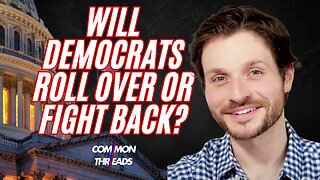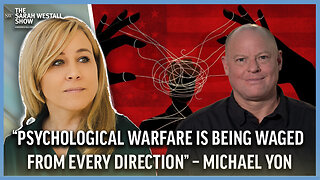Premium Only Content

Episode 2605: Voting as a Catholic: Part 1: The Church's Teaching on Politics and Government
Vote like a Catholic: Part 1 - The Church’s Teaching on Politics and Government
Welcome, friends, I’m Walt, your host, and joining me is our co-host Sharon. This is yet another series that will consist of 11 episodes. The purpose of this series is to properly advise fellow Catholic on how to properly consider their voting decision with 16 days left until November 5th. There is so much conflicting information out there on how you should consider your responsibility as a Catholic. Hopefully we can clear that up or at least provide you something you may have not had before.
Opening Prayer
Invoking God’s Wisdom and Guidance in Political Participation
In the name of the Father, and of the Son, and of the Holy Spirit. Amen.
Heavenly Father,
We gather before You today, seeking Your wisdom and guidance as we discern our role in the civic life of our nation. You have called us to be faithful citizens, not of this world, but witnesses of Your truth within it. Help us to align our decisions and actions with Your will, never compromising the values that reflect the dignity of life, justice, and mercy.
We entrust this gathering to the intercession of Our Blessed Mother, asking her to guide us as she did the apostles, always pointing us toward Your Son, Jesus Christ, in whose holy name we pray.
Amen.
In the name of the Father, and of the Son, and of the Holy Spirit. Amen.
Faithful Citizenship: Catholic Engagement in Politics
Host (Walt):
Sharon, we’re diving into a topic that’s so relevant right now Catholics and politics. With all the noise in today’s political landscape, we often hear questions like, “How do I make the right choices?” or “Is it okay to vote for a candidate who doesn’t align perfectly with Church teaching?”
Cohost (Sharon):
That’s right, Walt! It can be overwhelming, but the Church offers timeless guidance to help us navigate the political sphere. In today’s episode, we’ll explore key Church teachings on civic participation, moral responsibility, and the principles of subsidiarity and solidarity. We’ll also look at how voting isn’t just a right but a duty and ultimately, how we can be faithful citizens without compromising our values.
Politics as a Means to the Common Good
Walt:
Let’s start with St. Thomas Aquinas, who reminds us that “The common good is the object of every authority; and thus, every authority is ordained to the common good.” Politics, at its best, is about promoting the good of society, human dignity, and natural law. However, our participation in politics isn’t about winning or gaining power. It’s about transforming society through truth and love, as Pope Benedict XVI explained in Deus Caritas Est.
Sharon:
Yes, Benedict was clear that while the Church doesn’t prescribe political solutions, our actions in the public square must be rooted in love of neighbor. Politics can never replace our ultimate mission, which is to bring Christ into every corner of society.
Walt:
So, how do we stay faithful in a culture often at odds with the Gospel? John Paul II’s Evangelium Vitae gives us a clear answer: Voting is a moral act with eternal consequences. Supporting intrinsic evils, such as abortion or euthanasia, is never an option for Catholics.
Subsidiarity and Solidarity: Guiding Our Political Engagement
Sharon:
The Church gives us two essential principles to apply in politics: subsidiarity and solidarity. Subsidiarity teaches that decisions should be made at the most local level possible, to respect human freedom and family life. For example, the government shouldn’t overstep its bounds by taking over roles that belong to parents or communities.
Walt:
That’s a key point, Sharon. Subsidiarity protects individual dignity and prevents the state from becoming too powerful. But, on the other hand, we need solidarity a recognition that we are all connected. Catholics are called to care for the vulnerable and work for a just society.
Sharon:
The beauty of these two principles is that they balance each other. Without subsidiarity, you get oppressive government control. But without solidarity, you risk selfish individualism. Political engagement means we need to promote both freedom and responsibility—especially when voting.
The Church’s Neutrality and Our Moral Duty
Walt:
Now, the Church supports democracy because it respects human dignity and allows people to participate actively in governance. But here’s the thing: the Church doesn’t endorse political parties.
Sharon:
That’s right. Why? Because no political party fully embodies Catholic teaching. The Church transcends politics her mission is about salvation, not partisan agendas. We have to evaluate candidates and policies based on moral principles, not party loyalty.
Walt:
And here’s where things get tricky. Sometimes we find ourselves in a situation where no candidate aligns perfectly with Catholic values. This is where the concept of voting for the “lesser evil” comes in. Supporting the candidate who poses the least harm can be a legitimate way to minimize evil in society.
Sharon:
Or, perhaps another way to say it is, who will uphold the most good? But it’s not just about strategy. Each vote expresses our values and priorities. As Catholics, we have a moral duty to use our vote to advance the common good and protect human dignity. At the same time, we need to avoid giving scandal sending the wrong message by appearing to endorse immoral policies.
Faithful Citizenship as a Path to Holiness
Walt:
Voting isn’t just a political exercise it’s a way to live out our faith. As the Second Vatican Council reminds us in Gaudium et Spes, political authority exists to promote justice and human dignity. Catholics are called to bring the light of Christ into the public square, working for laws and policies that reflect truth.
Sharon:
That’s so important, Walt. Faithful citizenship isn’t about achieving political power it’s about bearing witness to Christ. Politics is just one way we live out our love for neighbor. And while democracy is a gift, it must be rooted in truth and virtue. When society rejects natural law, democracy can become an instrument of injustice.
Walt:
Exactly. Our engagement in politics is a duty, but it must be done with wisdom, charity, and faithfulness to the truth. Voting is both a right and a responsibility. And at the end of the day, it’s not about building an earthly kingdom it’s about working toward the Kingdom of God.
Conclusion and Practical Takeaways
Sharon:
So, what can we take away from today’s discussion? First, remember that politics is a means to promote the common good, not an end in and of itself. Second, evaluate candidates and policies based on Catholic principles especially on issues involving intrinsic evils…abortion is murder not women’s healthcare! Sorry but that makes me so angry. It was called women’s choice but they elevated it to healthcare? And finally, vote with a well-formed conscience, balancing subsidiarity and solidarity.
Walt:
And don’t forget our ultimate goal is not political success but faithfulness to Christ. Even in the most difficult elections, we must stay rooted in hope, knowing that God is in control.
Closing Prayer
Walt:
Let’s end today’s episode with a prayer.
In the Name of the Father, and of the Son, and of the Holy Spirit. Amen.
Heavenly Father,
You are the source of all truth and justice. Guide us as we participate in the political life of our nation. Help us to vote with well-formed consciences, always seeking the common good and protecting the dignity of every human person.
Give us the wisdom to recognize policies and candidates that align with Your will, and the courage to reject those that oppose Your truth. Strengthen us to be salt and light in the world, transforming society by our witness to Christ.
Blessed Mother, Seat of Wisdom, pray for us. Lead us closer to Your Son, that in all we do, we may give glory to God and build His Kingdom on earth.
We ask this through Christ, our Lord. Amen.
St. Thomas Aquinas, pray for us.
St. John Paul II, intercede for us.
Our Lady of the Immaculate Conception, pray for us.
In the Name of the Father, and of the Son, and of the Holy Spirit. Amen.
Walt:
That wraps up today’s episode! Thank you for joining us as we explored what it means to be faithful citizens in the world today.
Sharon:
If you found this episode helpful, please share it with others. Together, let’s build a society that reflects the truth and love of Christ.
Walt:
Until next episode on Voting with a Well-Formed Conscience, stay faithful, stay hopeful, and remember our mission is to transform the world through Christ. God bless you all!
-
 1:05:31
1:05:31
Glenn Greenwald
9 hours agoSection 702 Warrantless Surveillance Ruled Unconstitutional: Press Freedom Advocate Seth Stern Explains; The Rise of Unions & the Impact of Trump's Populism with Author Eric Blanc | SYSTEM UPDATE #395
105K96 -
 1:01:13
1:01:13
The Amber May Show
8 hours ago $2.98 earnedWomen Of Rumble | Amber, Kelly and Wendy Wild
44.2K4 -
 1:16:38
1:16:38
Josh Pate's College Football Show
10 hours ago $2.05 earnedCFP Title Viewership | JP Poll Under Attack | Bama & Oregon Season Grades | Most To Prove In 2025?
43.5K -
 5:10:59
5:10:59
VOPUSARADIO
14 hours agoPOLITI-SHOCK! "THE TIDE IS TURNING"! 3 SPECIAL GUESTS JOINING US TONIGHT!
28.7K2 -
 52:47
52:47
Kimberly Guilfoyle
12 hours agoDismantling DEI Once and For All, Live with Tyler O’Neil & Eric Deters | Ep.190
95.4K41 -
 1:34:59
1:34:59
Redacted News
11 hours agoBREAKING! TRUMP SIGNS ORDER TO RELEASE JFK FILES, CIA IS FURIOUS | REDACTED NEWS
221K401 -
 1:36:09
1:36:09
Benny Johnson
12 hours ago🚨WATCH: President Trump Declassifies JFK, RFK, MLK Files LIVE Right Now in Oval Office, History Now
168K322 -
 2:02:09
2:02:09
Common Threads
10 hours agoLIVE DEBATE: Will Democrats Roll Over or Fight Back?
29.9K1 -
 54:47
54:47
LFA TV
15 hours agoDonald Trump Sets Israel Up for Failure | TRUMPET DAILY 1.23.25 7pm
31.6K49 -
 1:34:21
1:34:21
Sarah Westall
9 hours agoPsychological Warfare, Modern Weapons of War, Panama Canal, Special Ops & more w/ Michael Yon
43.5K13